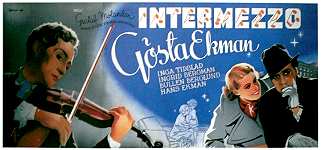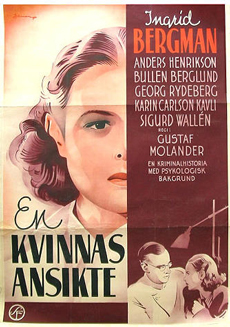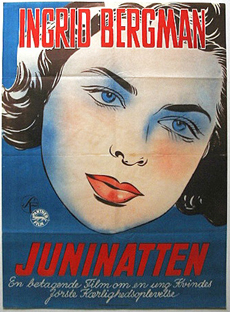
 |
|
|
|
Most older movie fans are still unaware that Ingrid Bergman's career didn't begin in the United States. That's better than average younger fans, who more often than not know only Casablanca as a Bergman starring role, if they can place the name at all. But Kino International has gifted us with the fascinating 3-Film DVD set Ingrid Bergman in Sweden, which contains two of her most famous Swedish pictures plus a romantic drama that's better than either of them. The two 'famous' titles may have been the only foreign Bergman pictures to be shown in the United States before her big splash in 1939, as a David O. Selznick import. Bergman was the new Garbo, the Swedish beauty that so enchanted European audiences that MGM saw fit to bring her to Hollywood in the 1920s. Selznick's eye for talent at this time was unerring. I don't know if Greta Garbo had to withstand the same treatment, but Bergman's first American assignment was to remake her own Intermezzo, from 1936, as Intermezzo: A Love Story, with Leslie Howard, at the time a major screen heartthrob. The original Swedish picture presented here is similar but less glossy and a bit more natural. Bergman gets third billing and isn't made the dramatic focus of every scene. What's more interesting -- about all three of these Swedish films -- is that the screenplay doesn't go to extreme lengths to apologize for the characters' moral lapses. Lovers change partners and people get hurt. The beautiful stars don't get a free pass, and neither are they condemned. Bergman's characters are ambitious and selfish about their desires, unlike the "noble" adulterers of many of her American pictures. 
The story of Intermezzo is almost identical. Promising concert pianist Anita Hoffman (Bergman) teaches piano to young Ann-Marie (Britt Hagman), and falls in love with the girl's father Holger (Gösta Ekman), a renowned violin virtuoso. Holger is often away on concert tours, which strains his marriage with the patient Margit (Inga Tidblad). Margit agrees in principle that Holger needs to keep "fresh" to feed his talent, but is crestfallen when her husband takes off on his next major European tour with Anita as his accompanist. For her part, Anita is shelving her own promising career for this romantic fling. Holger's abandonment of his daughter begins to haunt him, and the mood of their romance changes. Anita prepares to simply leave, to make things easier. The only major difference between the two movies is tone. The Swedish original spends less time with the suffering of Anita and Holger, which in the remake seems rather disingenuous -- Bergman and Howard have their cake and eat it too, in soap opera terms. Although the Swedish movie is just as reserved as Selznick's, it's more obvious that Holger and Anita's romance is sexual, whereas in the American film they do a lot of posing for great close-ups. Although Bergman's transparent emotions are what we remember most, the original is written as Gösta Ekman's film. Anita even drops out before the finish. Perhaps her absence only made Bergman seem more vital, as she alone among the cast has the 'magic' to project her feelings directly through the camera. Intermezzo was the crowning success of Bergman and her 'formative' Swedish director Gustaf Molander. In America Bergman got involved in musical-chairs games for female lead roles, and remakes of foreign hits, more than once. Her big success Gaslight was a revamp job on an English hit starring Diana Wynyard. 1938's A Woman's Face (En kvinnas ansikte) was of course remade by MGM as a Joan Crawford picture a couple of years later, when the actress was desperate for an attention-getting role. This time around we can see that the original film, while certainly different, is a rather far-fetched tale, one of those trick plots that one might see in a cheap film noir a few years later. The idea is to give Ms. Bergman contrasting roles, as a ruthless and hateful criminal who transforms into a caring, warm human being. 
The original story is almost too simple. Evil Anna Holm (Bergman) has a horribly disfigured face. She runs a gang of cheap blackmailers. Anna is personally putting pressure on an unfaithful wife when the woman's husband, Dr. Wegert (Anders Henrickson) catches her in the act of stealing. A great humanitarian, Wegert also happens to be an ace plastic surgeon (surprise!) who donates his services to Anna's cause. Several months later, Anna emerges with a pristine, scar-free face and takes a new identity. Happy that she will now be accepted in public, Anna hires on as governess for the little heir to the Barring industrial fortune, and moves to the family's factory-chalet high in the snow country. But her gang is still active, and conspires with rotten Torsten Barring (Georg Rydeberg) to gain control of the Barring fortune. Anna is expected to murder the young heir, Lars-Erik (Göran Bernhard). She has come to love the Barrings, and doesn't know what to do. The Swedish makeup artists give Bergman interesting facial scars that pull one eyelid down Lon Chaney-style, and enforce a wicked doll-like smile onto one corner of her mouth. The intent of Bergman and Molander must have been to demonstrate Bergman's acting range. As Anna Helm she's not really convincing, if only because we never buy the idea that Anna's disfigurement mandates her revenge on a world that shuns her. That message gets lost when Dr. Wegert's plastic magic turns the vicious Anna into a woman with a new personality, who cries in gratitude when a small boy asks for a goodnight kiss. From that moment on the movie becomes an unbalanced melodrama. Faced with a choice of saving a boy's life or maintaining her status with her new family, Anna stalls and balks. Again we're compelled to compare this Baltic curiosity with its ultra-glossy MGM remake. Joan Crawford and George Cukor amp up every aspect of the picture, in some ways improving it. Joan's a more convincing criminal monster, at least on a comic-book level. The remake adds quite a lot to the transition scenes, showing Crawford's Anna luxuriating in a room lined with mirrors that are no longer her enemy. The remake also benefits from the presence of Conrad Veidt, whose malevolence is a good counterpoint to Anna's earlier disfigurement. MGM adds an entire, rather overblown action finale to deal with Veidt's villain, who seemingly takes Anna's sins with him when he departs. In the original, Bergman's Anna can't transfer her complicity to another character, and the show ends on a much more complex note that reminds us of her later Fox vehicle The Inn of the Sixth Happiness. Frankly, unless you're into star worship, a great deal of classic Hollywood moviemaking can be a big bore, in terms of narrative possibilities. None of these three Swedish pictures have conventional romantic endings. This not only keeps us off balance, it gives Ms. Bergman's more emotional scenes greater weight. Neither she nor we can assume that her character will live happily ever after. June Night (Juninatten) was Bergman's last Swedish film for over 40 years. It is the most interesting title in Kino's set, and not just because the story is new to us. Working with another director, Per Lindberg, Bergman takes the star role in a contemporary (1940) tale of love and scandal. Seen through the filter of another culture, June Night's view of morality and premarital sex is unlike anything being made in Hollywood at the time. 
Young, adventuresome Kerstin (Bergman) has a fling with Nils, a sailor (Gunnar Sjöberg). When she arbitrarily breaks off the relationship, Nils shoots her. Kerstin survives with a weakened heart and is given a merciless beating in court, a scandal that's picked up by an ambitious Stockholm reporter, Willy (Hasse Ekman). Now nationally known as "The Wounded Swan", Kersten changes her name to the romantic-sounding Sara Nordaná and quietly relocates to Stockholm, where a job has been arranged for her at a pharmacy. The friendly nurse Åsa helps Sara move in with three other lively girls, all of whom want a man of their own. Åsa is engaged to Stefan, a doctor (Olof Widgren) and sleeps with him on occasion. Nickan (Marianne Aminoff) is a telephone operator for the Dagsnyheterna, Willy's paper. She's Willy's virginal girlfriend and desperately wants him to propose. Things heat up when Stefan sees Sara in the medical offices and is instantly attracted to her -- the sweet Åsa feels threatened and doesn't know what to do. Then Nils shows up, paroled early from his prison sentence. He apologizes but really wants Kersten/Sara to come back to him. Sara's heart can't stand the emotional strain. June Night's vision of romantic delirium is justified by the nature of its confused, suffering heroine, the "Wounded Swan". Kersten/Sara works at the Swan Pharmacy and suffers from an ailment that kicks in when "matters of the heart" overwhelm her. This picture of young Swedes in love is untouched by the Production Code restrictions that neutered American films. In 1940 Hollywood's approved version of young love, Judy Garland might cry because Mickey Rooney is taking Ann Rutherford to the big dance, but a happy ending was assured. Per Lindberg's young adults are on their own, operating outside the supervision of parents. Kersten is a sexually charged catalyst wherever she goes, turning the heads of young men already involved with her new friends. She hides her past, but we know it will all catch up to her. The drama is frank and realistic in a way that American movies weren't until the 1970s, if then. Åsa is a sweet and sensitive darling, who knows Sara's secret and remains a true friend even when Sara threatens her own romance. Åsa is by far the film's most ethical and thoughtful character, and yet she is the one sleeping with her fiancé. In Nickan we get a no-nonsense portrait of a woman being used by a career-minded boyfriend. Their relationship is put to the test as well. We're also impressed by the film's view of journalistic ethics. Willy's editor wants to pillory Kersten as a small-town hussy until he sees her photo, and immediately decides that Willy has done the right thing in defending her in print. When Willy later wants to exploit "Sara" as a tabloid sensation, the editor refuses, as doing so would be outright persecution. We wonder if this enlightened attitude reflects Swedish newspaper policy of the time, or if it is a screenwriter's moral statement. The ethical editor makes a nice contrast with the awful woman who destroys Kersten's reputation at the trial. The film's ending is a thought-provoking surprise. It simply has no equivalent in American movies, where romantic dilemmas are usually solved through whatever convenient expedient will keep the stars together and neutralize/eliminate surplus suitors. Here, romance is revealed as the essentially cruel and selfish thing it is -- amorous rivalries always leave somebody alone and hurting on the battlefield. Kersten/Sara may be emotionally delicate but she knows very well what she wants. I generally avoid the lazy habit of relating actors' movie roles to their private lives, but June Night really seems a foretaste of the Ingrid Bergman to come. She refused to play noble for the press or to serve as a role model for a conventional moral value system. Ingrid went her own way, and is remembered as nobody's fool. Kino's Ingrid Bergman in Sweden 3-Film Collection is a great little DVD box that gives us a familiar (and drop-dead beautiful) face in a foreign setting. The films are licensed from Svensk Filmindustri. The transfers of Intermezzo and A Woman's Face are in good shape. Both titles were enormously popular, so we're very grateful for the improvement over some earlier, much more contrasty prints we've seen. June Night is in perfect condition in every respect. Cinematographer Åke Dahlqvist shot all three features in what looks like three different styles. The films are in Swedish with English subtitles. The discs come in individual slim cases with attractive photographs of the young Ms. Bergman. Bob Mastrangelo's liner notes give a brief rundown on her early career and the importance of the three titles in the set.
On a scale of Excellent, Good, Fair, and Poor,
Ingrid Bergman in Sweden 3-Film Collection rates:
Reviews on the Savant main site have additional credits information and are often updated and annotated with reader input and graphics. Also, don't forget the 2010 Savant Wish List. T'was Ever Thus.
Review Staff | About DVD Talk | Newsletter Subscribe | Join DVD Talk Forum |
| ||||||||||||||||||